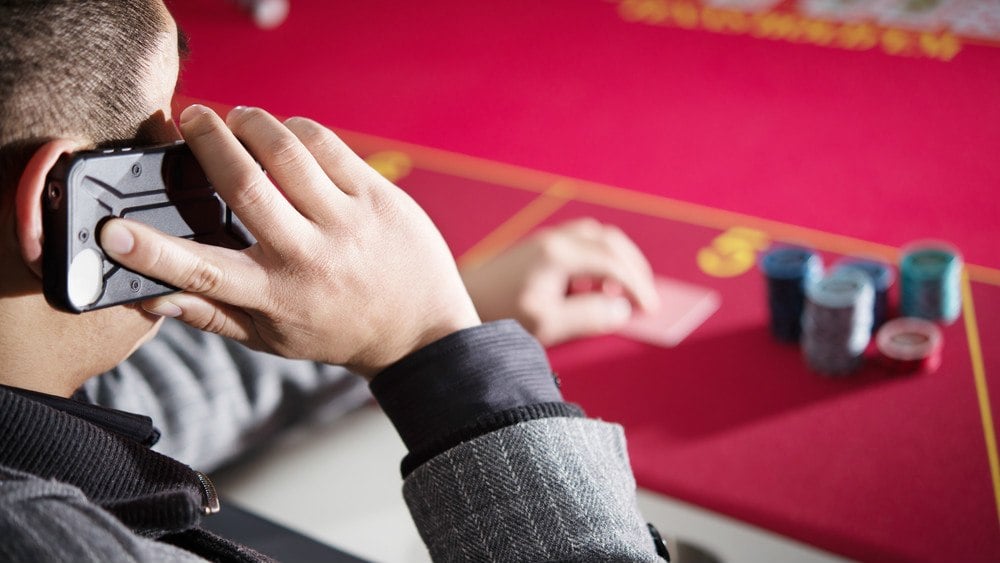Macau Casino Cell Phone Ban Still Ignored by Many Gamblers, Profitable Proxy Betting Continues
Posted on: April 28, 2017, 02:47h.
Last updated on: April 28, 2017, 02:55h.
One year after Macau issued a dictum barring the use of cell phones in the Chinese gambling enclave’s casinos, players continue to access their mobile devices while at the city’s tables, gaming regulators recently told Asian gambling news siteGGRAsia.

That continued practice means that “proxy betting,” the practice of one player who is physically in a casino taking bets by phone from one who is not, likely has continued at higher rates than one would expect from such a ban. And that, in turn, calls into question the likelihood that money laundering from mainland Chinese players continues, despite the inability of many whales from that country to take money with them when they travel.
No Trail to Follow
It was a year ago that the city’s Gaming Inspection and Coordination Bureau (often referred to by its Portuguese acronym DICJ) placed an official ban on the practice in Macau’s casinos. In a statement toGGRAsia last year, the DIJC said that the practice of continuing to allow VIP gamblers to use their phones with guidelines had led to “misunderstandings and doubts.” This, in turn, led the Bureau to create the full ban on phone use at gaming tables that went into effect on May 9, 2016.
But apparently the lucrative nature of proxy betting is not to be so easily abated in the Asian gambling hub. Global Market Advisors Partner Shaun McCamley, who wrote a white paper on the topic, says that large-scale proxy betting operations, which can involve as many as eight tables or more, take under six months to pay for any upfront costs involved. Most attractively, there’s no paper trail back to the absentee bettor, as the bet is placed, and cashed by, the present gambler in the casino (the proxy).
Dirty Laundry In, Clean Money Out
The attraction of this practice for so-called money launderers (typically criminals trying to turn ill-begotten currency into usable and untraceable “clean” currency or goods) is obvious. And where there’s motivation and money, rules will be broken.
Which may well be why the Macau gaming regulator reported 71 “verbal cautions,” according toGGRAsia, for alleged phone use violations. And although that ban was issued beginning last May 9, the majority of those warnings came between January and April of this year, meaning either players are becoming more brazen, or the DIJS is cracking down harder on the violators, or a little of both.
FinCEN Makes Casinos into Moles
Macau is not the only area troubled by criminals and money laundering. In the US, FinCEN (the Financial Crimes Enforcement Network) is the federal watchdog for such activities, and casinos are entirely within its purview.
In September 2016, FinCEN, along with the Department of Justice, let casinos know that Big Brother is watching them, and they better not try to hide anything.
“Casinos and card clubs often provide numerous financial services to their customers . . . The DOJ will pursue criminal charges and penalties against . . . [any of these] that willfully violate the Bank Secrecy Act (BSA),” Asset Forfeiture Money Laundering Section Deputy Chief Deborah Connor told those in attendance at the 9th Annual AML Conference in Las Vegas last year.
Related News Articles
Wynn Boston Harbor Paying Top Dollar to Demolish Nearby Homes
Tribe Plans to Challenge Feds on Lansing Casino
PAGCOR Auctioning Two Parcels of Land at Site of Solaire Casino
Most Popular
Mirage Las Vegas Demolition to Start Next Week, Atrium a Goner
Where All the Mirage Relics Will Go
Most Commented
-
Bally’s Facing Five Months of Daily Demolition for Chicago Casino
— June 18, 2024 — 12 Comments
















No comments yet